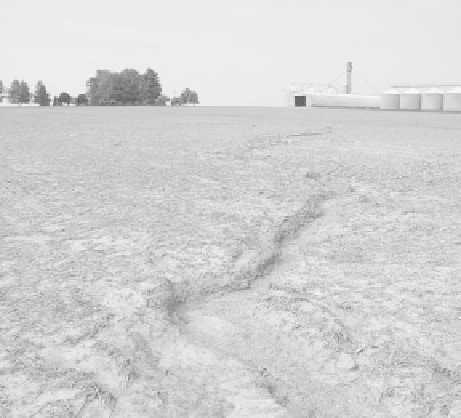Agriculture Reference
In-Depth Information
T A B L E 8.5. Effect of Adverse Weather Conditions on Agriculture Productivity
Plant or
Animal
Adverse Condition
Effect
Sugar beet
Excessive rain
Decreases sugar content
Onion
Low temperature and low
humidity
Decrease tuber production
Pear
Low night temperatures ,108
Premature ripening
Plum
Cool spring 7 - 88
Embryo death
Strawberry
High temperatures 308þ
No flower bud production
Pigs
High .408C temperatures
General decrease in productivity
Cattle
Low ,108C and
high .408C temperatures
General decrease in productivity
As noted above a different problem can also occur when high winds interfere with
pollination. Knocking plants down by any mechanism but most often by water and wind
is called lodging. The occurrence of lodging any time during plant growth causes plants
to yield less. However, it is more common for rain or wind to knock over crops when
they are heading out and the tops are heavy with grain. When the grain heads come in
contact with the ground, several things can happen. They may begin to rot and thus be
unusable. They may sprout and again not be useful as food. More often the bigger
problem is that the grain is hard to harvest and thus large amounts of yield are lost.
All low-lying areas have fertile soil and so are prized agricultural lands. However,
these same lands are subject to flooding. Flooding can wash away crops. However, it
Figure
8.17.
Soil erosion caused by intense rainfall on bare soil. (Courtesy of Matthew
Deaton.)












